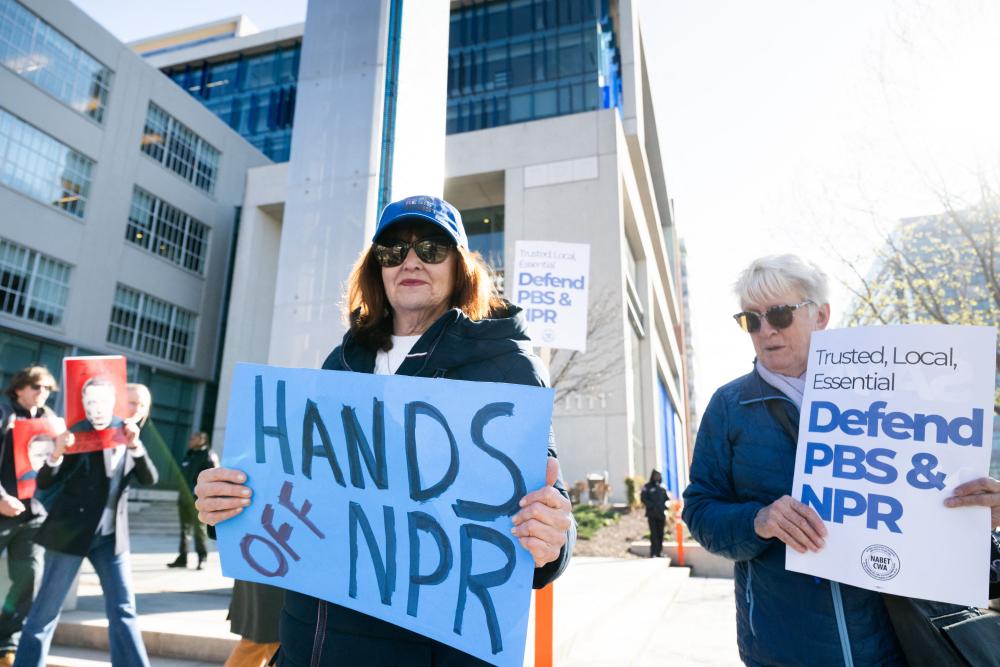In the Trump administration’s unprecedented war on the American media, a lawsuit brought by public broadcasters could mark a much-needed strike back for press freedom.
The lawsuit, brought by NPR and three Colorado-based public radio stations, challenges an executive order that cut federal funding to what Donald Trump described as “biased media”, with lawyers arguing that the order violated the first amendment right to free speech.
The decision by NPR, KSUT, Roaring Fork and Colorado Public Radio to take on Donald Trump comes as the president has targeted multiple news organizations through lawsuits and investigations – and as experts warn some outlets are acquiescing to Trump’s war on the media.
NPR’s lawsuit could be a prominent pushback against that. The lawsuit argues that Trump’s executive order, signed on 1 May, violates the first amendment by targeting NPR for news coverage the president considers “biased”. NPR and its partners are aiming to have the order, which would strip direct and indirect funding from NPR and PBS, permanently blocked and declared unconstitutional.
Experts believe NPR has a strong case, and that it could be Trump’s attacks on public media that could hand NPR a win. The president and the White House have described NPR and PBS as being “leftwing propaganda”, and has criticized the network for discussing LGBTQ themes.
“Trump’s honesty about why he wants to eviscerate federal funding for NPR and PBS could be his legal downfall,” Jessica Levinson, a professor at Loyola Law School and host of the Passing Judgment podcast, wrote in an op-ed for MSNBC.
“NPR has thus argued that Trump admitted that he’s using his power as head of the executive branch of our government to target NPR and PBS because he disagrees with the content of their speech.”
Levinson wrote: “The Trump administration isn’t targeting NPR because it covers political news. To the contrary; the administration appears to have explicitly admitted that it’s targeting NPR because of what Trump considers to be its bias as it covers political news. NPR’s lawsuit argues that, therefore, Trump’s executive order is ‘textbook retaliation and viewpoint-based discrimination.’”
Trump’s pursuit of NPR follows a pattern of the president’s second term, with Trump keen to target media organizations he believes have reported on him negatively.
The Associated Press, one of the world’s premier news agencies which is relied upon by thousands of news outlets, was banned from the Oval Office and Air Force One after it refused to use Trump’s preferred term of “Gulf of America” to refer to the Gulf of Mexico.
Trump is suing the owner of CBS News for $10bn, alleging the channel selectively edited an interview with Kamala Harris, which the network denies, and the Des Moines Register newspaper, which he accuses of “election interference” over a poll from before the election that showed Kamala Harris leading Trump in Iowa.
NPR has been vocal in its opposition to the lawsuit.
“It is evident from the president’s executive order, as well as statements released by the White House and prior statements by the president that we are being punished for our editorial choices,” Katherine Maher, the CEO of NPR, said in an interview with the station this week.
Maher added: “We are not choosing to do this out of politics. We are choosing to do this as a matter of necessity and principle. All of our rights that we enjoy in this democracy flow from the first amendment: freedom of speech, association, freedom of the press. When we see those rights infringed upon, we have an obligation to challenge them.”
The funding cut, NPR said, “would have a devastating impact on American communities across the nation”, adding: “Locally owned public media stations represent a proud American tradition of public-private partnership for our shared common good.”
“The Corporation for Public Broadcasting [which distributes funds NPR and other public media] is creating media to support a particular political party on the taxpayers’ dime,” Harrison Fields, a White House spokesperson, said in a statement.
“Therefore, the president is exercising his lawful authority to limit funding to NPR and PBS. The president was elected with a mandate to ensure efficient use of taxpayer dollars, and he will continue to use his lawful authority to achieve that objective.”
Read the full article here


